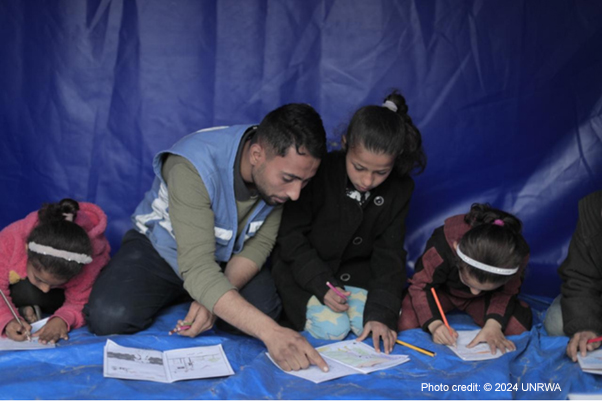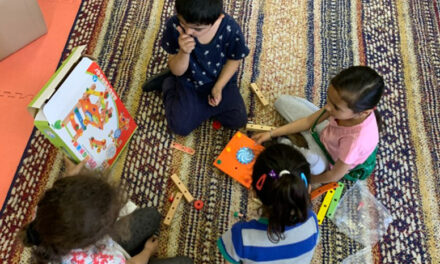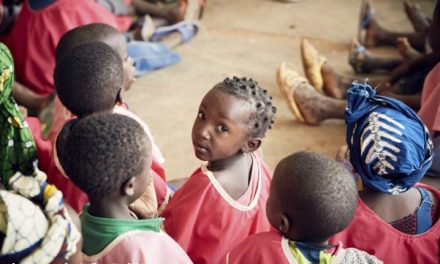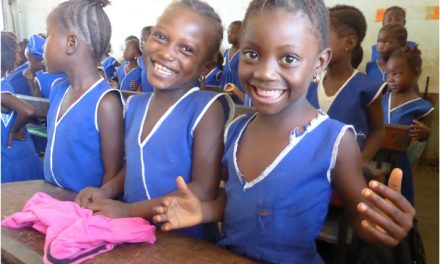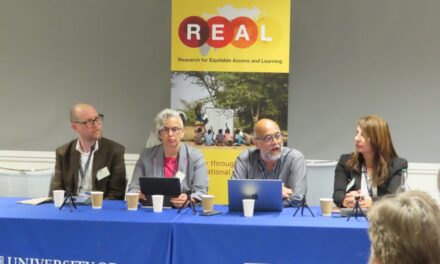This blog was written by Sally Beiruti and Professor Yusuf Sayed, REAL Centre at the Faculty of Education, University of Cambridge. This blog draws on a new report on Palestinian education under attack in Gaza, by the REAL Centre at the Faculty of Education, University of Cambridge, and the Centre for Lebanese Studies, in partnership with UNRWA.
On this 2024 World Teachers’ Day, we remember the teachers who have struggled around the world for just peace and recognition, including in war and conflict. This day is a symbol of acknowledgment of teachers’ key role in ensuring equitable and quality education for all, particularly those marginalised and oppressed.
Despite living under occupation, 17 years of blockade, recurrent attacks, and now a year of the ongoing war, teachers and counsellors in Gaza have demonstrated commitment to serving their communities and affirming their students’ identity and their right to education. Between October 2023 and July 2024, almost all school buildings in Gaza were either entirely or partially destroyed following Israeli military strikes. As of August 2024, according to the Ministry of Health, as reported by the United Nations Office for the Coordination of Humanitarian Affairs, these attacks have killed over 40,000 Palestinians, including 10,627 children and 411 teachers. Furthermore, these attacks have resulted in at least 94,000 Palestinians injured, including 15,394 students and 2,411 teachers. These numbers are likely to be underestimates, given difficulties in communication. An interviewee stated:
“Some of our colleagues [counsellors and teachers] have been [killed] and lost all their families.”
Teachers in Gaza, living under war, bombardment, hunger, and siege, exemplify teaching as an act of sumud – an Arabic term that is often translated as “steadfastness”, and best describes Palestinian perseverance and struggle against occupation. To mark this World Teachers’ Day, we listen to their voices and support the call for a social contract for teachers in the Occupied Palestinian Territory to affirm their rights, have their efforts recognised, and have their voices centred in conversations about education reconstruction.
The physical health of teachers is deteriorating in the same ways as the general population, with limited access to medical services and the spread of diseases. Experiencing multiple displacements, living in overcrowded areas with limited hygiene facilities and access to water, as well as a lack of privacy, additionally harm the psychosocial wellbeing of teachers. With increased attacks on schools, teachers sheltering inside them live in constant fear of death or injury.
Teachers are disillusioned and disappointed in the lack of action and support internationally. The reality of frontline educators working in a war zone is that they have to deal with the effects of the ongoing war as they support their students. An interviewee stated:
“Some dive into their commitment to their community to try to find a way out of this situation. So, they are involved in different initiatives to support the community.”
Amidst the incessant attacks, many teachers and counsellors have continued to provide services and support children’s learning throughout this war. Their dedication underscores their resilience and efforts at keeping education hope alive and working towards transformation. Teachers and counsellors have been playing other key child protection roles, identifying unaccompanied children and working with vulnerable children.
Teachers and counsellors have been leading the learning programme offered by UNRWA, in which they offer recreational activities, focused on games and drawing, including some basic learning activities. They are collaborating with families and communities to utilise space in the shelters for learning purposes, notwithstanding the continued displacement and dangers associated with the war.
Capacity-building efforts will be crucial to prepare teachers and counsellors – both during the ongoing conflict and in the post-war period once a permanent ceasefire is established. These efforts include empowering teachers, counsellors, and social protection staff to support children who are experiencing trauma. Given the scale of the learning loss projected in the report, teachers require support to offer additional learning assistance for educational recovery. Additionally, they will need to address inclusion in classrooms, particularly as many students will have war-induced disabilities. Further support involves establishing referral pathways for child protection, identifying cases requiring mental health services, and offering direct psychosocial assistance.
Any discussions about the return to education must include robust support for teachers and counsellors, with a particular focus on their physical and mental health. This requires substantial, long-term psychosocial and other forms of support. An interviewee stated:
“We must prioritise the wellbeing of the teachers themselves. It’s unreasonable to expect them to provide educational services when they lack basic necessities such as hygiene kits, food, and shelter.”
Additional teachers will be crucial in rebuilding Gaza’s education system as many have been killed and those remaining will need to play a larger role to support their traumatised students. An interviewee stated:
“We need additional staff. Additional counsellors to effectively function while we restore work. We need more teachers. We need exceptional numbers to catch up and respond to needs.”
Currently, educational materials are not entering Gaza due to restrictions imposed by the Israeli authorities, making it difficult to support teaching and learning. Lifting the blockade and allowing the entry of essential educational resources, including assistive devices for disability needs, is vital to support teachers in their work. An interviewee stated:
“Since October 7, all educational materials and stationery have been blocked… Restrictions on these necessary materials must be lifted as soon as possible.”
A permanent ceasefire, in line with the International Court of Justice advisory opinion, and an end to the occupation, are required urgently as the right to equitable and quality education for Palestinians in Gaza cannot be deferred. Concrete action for a permanent ceasefire must be accompanied by support for the small-scale education actions by Palestinian teachers, students, and communities in Gaza.
On this World Teachers’ Day, we urge teachers worldwide to amplify the voices of their Palestinian colleagues and show tangible solidarity with teachers who continue to educate their students while enduring the hardships of the ongoing war in Gaza. An interviewee stated:
“If international organisations are to focus on anything, it should reflect the priorities identified by the people of Gaza.”
——–
The authors dedicate this report to the children, young people, teachers, and counsellors of Gaza who daily demonstrate their spirit, determination, and courage to assert the right to equitable and quality education in Gaza.
The views expressed in this blog and report are those of the authors and do not represent that of their institutions, UNRWA, their partners or funders.

